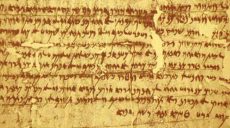Aderbad Bin (son of) Mahrespand was the Mobedan Mobed (Supreme Pontiff) and Prime Minister during the long reign (309-379 A. D.) of Shapur Hormazd also known as Shapur II. According to the Pahlavi Dinkard, from his father’s side, Aderbad Mahrespand belonged to the family of Zarathushtra, and from his mother’s to the family of Shah Vishtasp. During […]
Author: Noshir H. Dadrawala
Khordadsal – A Perfect Day In Our Perfecting Lives!
Today, Saturday, 21st August, 2021 is Khordad Roj of Fravardin Mah, which we traditionally celebrate as Khordadsal, commemorating not just the birthday of Asho Zarathushtra, but also rededicating our lives to His timeless message of attaining happiness by making others happy and perfecting the imperfections in our lives by making the right choices. In the […]
Co-creating A Kinder And Loving World
This Shahenshahi New Year, let’s co-create with Ahura Mazda and with His Wisdom, a kinder and more loving world to live in. Let this be a promise we make to ourselves individually and collectively, as a community. Let us resolve to make this goal an attainable purpose of our daily living. Let this not just […]
Homage To Our Dear Departed
Almost every religious tradition observes a day or days for remembering their near and dear departed ones. They say grief is the last act of love that we offer to those we loved; and remembering them is akin to breathing life into their fading presence from our life. Most humans, by nature, are ritualistic and […]
Vendidad – The Law Against Forces of Evil
Among ancient Zoroastrian sacred texts, the Vendidad is probably the most significant – both historically and liturgically, and yet, it is condemned as an outdated ‘Zoroastrian Penal Code’ and the work of babbling Magi priests obsessed with imaginary demons and magic. Even today, many question the historical significance of the Vendidad. Let us understand that it is the only Nask or […]
‘Aspandarmad’ Embodies Piety And Devotion
Aspandarmad or Spendarmad is the twelfth and last month of the Zoroastrian calendar. It is dedicated to Spenta Armaity – the divinity presiding over Mother Earth. While the term ‘Spenta’ can be variously translated as ‘increasing, growing, good, holy and benevolent’, the term ‘Armaity’ can also be variously translated to mean ‘devotion, piety and peace’. Spenta Armaity is an Amesha […]
Bahman – the key to Ushta
To Zoroastrians Bahman Mah is what Shravan Maas is to the Hindus. Just as Hindus avoid non-vegetarian food during Shravan Maas, Zoroastrians also do likewise during Bahman Mah. However, while Hindus also observe fasting during the month of Shravan Zoroastrians do not. Interestingly in the Zoroastrian calendar of three hundred and sixty-five days there is […]
Lessons From The Life Of Dasturji Jamshed Sohrab Kukadaru
26th May, 2021 will commemorate the 190th birth anniversary of the saintly Zoroastrian priest, healer, astrologer and alchemist – Dasturji Jamshed Sohrab Kukadaru. He was born in Surat on 26th May, 1831 (Mah Ava, Roj Zamyad) and passed away on 5th September, 1900 (Mah Fravardin, Roj Behram) of the Shahanshahi Yazdezardi calendar. Even after close […]
The Power Of Our Prayers
Prayers and rituals are born of man’s adoration for that unseen power underlying the mystery of life. Each religion prescribes its own set of practices as a means of adoration or worship or to encourage humility and surrender, resulting in spiritual purification necessary for inner growth. Prayers and rituals distinguish a religion from a mere […]
Navroz 2021 – Celebrating Hope And Renewal
Festivals bring hope and happiness. They open opportunities for bonding and togetherness. The spring festival of Navroz is no exception. It ushers a new day (Nav = New and Roz = Day), new beginnings and a brand-new life. Hope is a very powerful and positive resource. It inspires us to achieve the impossible and also […]
Meher Mahino – Meher Roj Mubarak!
. In the Zoroastrian Calendar the year comprises twelve Mah (months) with each month aggregating exactly thirty Roj (days) and thus a year of three hundred and sixty days to which are added the stand-alone five days of the Gatha which are not linked to any particular month. The fifteenth day every month is dedicated […]










